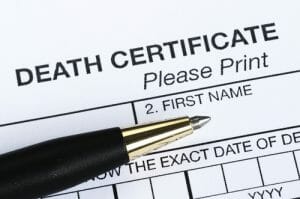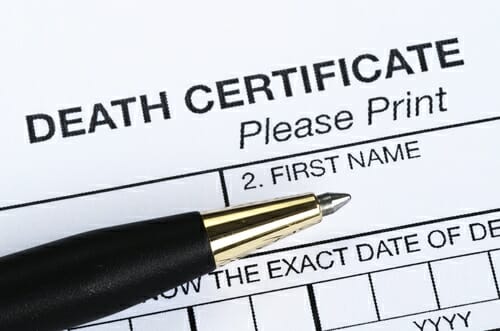 The Importance of Obtaining a Death Certificate
The Importance of Obtaining a Death Certificate
{Read in 5 minutes} This topic seems absurd. Doesn’t it? And frankly: it is. However, it probably comes up at least several times a month in my practice when representing the interests of parties in the Surrogate’s Court. Why? Well, think about it. The Surrogate’s Court is a Court that generally handles affairs of people who are deceased, so that means that before I can file any papers in the Surrogate’s Court, the Clerks are going to ask me to present a death certificate.
By the way, it’s not just limited to court filings. For example, if a deceased has left an account that names a beneficiary on a designation form, a beneficiary can usually collect it without going to court because it avoids probate. But no bank will surrender the funds until they get a certified death certificate — what if the person’s still alive? Speaking only for myself, I’d be more than a little annoyed if my bank gave the funds in my bank accounts to my beneficiaries while I was still alive! These chicken-and-egg problems survive even death itself.
This is all well and good, but how does one get their hands on a death certificate in order to give them to the parties who are demanding them? Okay, the answer is that death certificates are controlled by the city, county or state government (depending on where the person died), and can only be obtained by certain people.
Here in the City of New York, the Department of Vital Records controls all death certificates and can help people order same. Death certificates come with the raised seals of the City of New York to show their authenticity. Who is allowed generally to order death certificates?
The Executor or Administrator of an Estate;
(Again: chicken-and-egg problem. Only the Surrogate’s Court can issue Letters, to an Executor or an Administrator, but a Surrogate’s Court will not accept any papers until they receive a death certificate.)
Certain family members such as a surviving spouse, adult children, parents, and siblings, are entitled to it as a matter of law.
So now that we know who’s entitled to it, how do people generally get their hands on a death certificate? Do they order it from the City, County, or State?
The answer is generally, no. Usually the undertaker who handles the disposition of the person’s remains (such as burial, cremation, et cetera) as part of their position, can order certificates at the time they are making the arrangements.
Very often, the undertaker will ask a family how many certificates they wish to order. My general advice is it’s always better to ask for a few more than is necessary because undertakers can get them quickly. Ordering them from the government usually takes a few weeks to process and can delay the administration of an Estate.
How do you estimate how many you need?
If you’re going to file a proceeding in the Surrogate’s Court to probate a Will, or appoint an Executor or an Administrator, you will need one for the Court. The Court does not return this certificate — it becomes part of the Court’s original papers like the original Will.
You will need one for each and every bank account, regardless of whether they are payable to a named beneficiary, or to the Estate. Often the bank scans the certificates and returns them, but sometimes they keep them.
You will need to mail in death certificates when filling out claim forms for life insurance or retirement accounts. Sometimes those institutions will return them and sometimes they do not. If you’d like one back, including a letter requesting that with a self-addressed stamped envelope often does the trick.
If the decedent owned real property, you will also need one to produce at the closing when you sell, or deed it over to the ultimate beneficiary.
Death certificates are also often necessary when filing income tax and estate tax returns.
I encourage people to count all of these up and if the families can afford it, (the cost is between $10 and $20 per certificate, depending on the municipality/state), it’s a good idea to order 8-10 at a minimum. Even if you don’t need them, family members often like to keep them for personal family records and genealogy records.
So, here is where a little bit of information up front can really help you out in the long run. If you find yourself in the situation where a loved one has passed, it’s always a good idea to order death certificates up front from the funeral director, who is the person who can get them the most readily.
If you or someone you know would like more information on this topic, please contact me.

